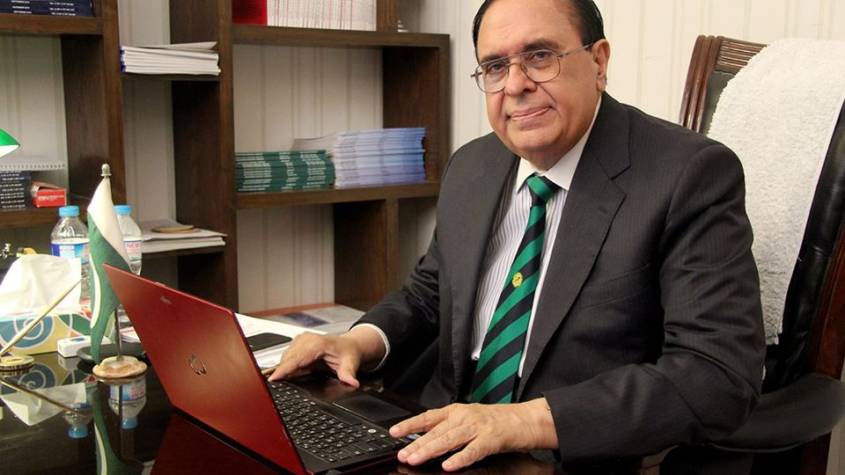Pakistani students should seize the opportunity by learning Chinese scientific knowledge and research
Renowned Scientist and Former Chairman Higher Education Commission (HEC), Dr. Atta-ur-Rahman has urged Pakistani students to study applied sciences at Chinese universities to benefit from Chinese scientific knowledge and research. He added that in the fields of nanotechnology and artificial intelligence, China is the leading scientific nation. Professor, Dr. Atta ur Rahman suggested that Pakistan can use the expertise and skill of these scientists by placing them in colleges, universities and laboratories to equip Pakistan with modern scientific knowledge and skills to train the next generation. China is going to acknowledge services by awarding him, China International Science and Technology Cooperation Award this month. Dr. Atta-ur-Rehman revealed that Pakistan is going to establish 20 centres of excellence in various universities with the Chinese assistance, adding that these centres would focus on sciences, hybrid seed production, virology, nanotechnology, agricultural food processing, mineral extraction and many other fields. He asked the government to build industrial joint ventures in high-tech manufacturing sector under the CPEC’s Special Economic Zones (SEZs).
ISLAMABAD, Jan. 8 (Xinhua) — Pakistan should send graduate and post-graduate students to study applied science at Chinese universities to acquire scientific knowledge and learn from the research China has done over the years, acclaimed Pakistani scientist Atta-ur-Rahman said.
China is an emerging power and it has already become one of the world’s leading countries in some fields of science like nanotechnology and artificial intelligence. Pakistan’s good relations with China provide it a golden opportunity to send its aspiring students to learn science at Chinese universities to get equipped with modern scientific knowledge.
“When the students return to Pakistan after completing advanced learning in China, Pakistan can get benefit from their expertise by hiring them at significant posts in colleges, universities and laboratories,” the professor at the International Center for Chemical and Biological Sciences (ICCBS) of the University of Karachi told Xinhua.
“It will not only provide the scientists a platform to conduct further research, but also give them a chance to teach advanced sciences to other students, and the whole process will gradually set the base of scientific studies on modern grounds in the country,” Rahman added.
“I always suggest that Pakistan should start taking benefit from China right now so that Pakistani students and researchers can grow with China in the field of science.”
An alumnus of King’s College of Britain’s University of Cambridge from where he received his PhD in organic chemistry in 1968, Rahman has won lots of awards in Pakistan including the highest national award Nishan-e-Imtiaz for his services to the country in the field of science, apart from a number of other international awards.
He is expected to receive the China International Science and Technology Cooperation Award in January for contributions he has made to China. Rahman considers it a great honor to be selected to receive the prestigious award from the Chinese government and credits the research on traditional Chinese medicine and in other fields, which he did with Chinese scientists and companies, for his selection for the award.
“I also have a number of international co-publications with Chinese scientists. Many Chinese scientists and pharmaceutical companies have visited Pakistan to conduct research in the ICCBS. By all these research and publications, I have made a small effort to promote Chinese science in the world.”
The professor is also the head of Pakistani Prime Minister Imran Khan’s task force on science and technology. The task force is aimed at making the country standout in the world in “specific and targeted fields.”
“Initially we have identified five areas including education, agriculture, minerals, information technology, and linkages of innovation with society which will focus on engineering and emerging sciences. Two new universities are also being established to give education of applied science.”
Development budget of the country’s science and technology has increased six-fold this year to encourage innovation, he said, adding that one of the main focuses of the Pakistani government is to change the direction of the country’s economy from agricultural economy to knowledge and science economy.
“China will be a great help for Pakistan to achieve the target and for that purpose we are forming 20 centers of excellence in various universities of the country with the help of China,” the professor said. These centers will include artificial intelligence in health sciences, hybrid seed production, virology, nanotechnology, railways engineering, agricultural food processing, mineral extraction and processing among others.
Many top Chinese institutes and universities including Shenzhen Institutes of Advanced Technology, China National Rice Research Institute and Wuhan Institute of Virology among others will cooperate with Pakistan to make these centers of excellence a success story, he added.
“I have a long and cordial association with China, and these centers of excellence will form linkages of young Pakistani scientists with China too, and they will act as an engine of scientific advancement for Pakistan by learning from China.”
Sharing his vision regarding the potential of the China-Pakistan Economic Corridor (CPEC) in development of science and technology in the country, the professor said that Pakistan should form joint industrial ventures in high-tech manufacturing with China to benefit from Chinese technological advancement and the Pakistani government is also working towards that direction in special economic zones.
Chinese envoy Zhao Shiren urges students to uphold integrity and strengthen China-Pakistan ties
LAHORE:The Consul Generals from several countries and other distinguished guests attended …











